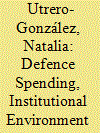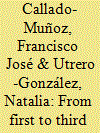| Srl | Item |
| 1 |
ID:
167860


|
|
|
|
|
| Summary/Abstract |
This paper analyses the impact of participating in a military alliance on the nexus between defence spending and economic growth. In particular, we study how the process of gradual association to a military organization influences the defence spending of newcomers, and consequently their economic growth. Conclusions from the theoretical model are tested empirically for countries in the North Atlantic Treaty Organization. Results show that the prospect of intensified military alliance partnership and membership has a positive effect on economic growth. In addition, increased security and stability gained by closer military cooperation reinforces the positive link with economic growth. Empirical evidence supports theoretical priors.
|
|
|
|
|
|
|
|
|
|
|
|
|
|
|
|
| 2 |
ID:
167461


|
|
|
|
|
| Summary/Abstract |
The paper adds to the debate on the relationship between military spending and economic growth by analysing the contribution of a military university centre to regional economic development. It goes beyond traditional economic impact studies by including research related effects and integrating “third stream” activities. Conceptualization and categorization are carried out to thoroughly analyse the different dimensions of knowledge and “third stream” actions. The analysis is performed from its settlement and during its first 5 years of existence which allows showing how the strategy of community engagement is developed. The conclusion suggests that, as traditional military roles extend, and military education institutions become higher education institutions, a comprehensive evaluation should be taken into account to enrich the public debate on government spending.
|
|
|
|
|
|
|
|
|
|
|
|
|
|
|
|
| 3 |
ID:
170249


|
|
|
|
|
| Summary/Abstract |
Military training has always been considered as an education system with its own characteristics that distinguished it from the rest of higher education. However, different initiatives have been developed in order to integrate military education in the European Higher Education Area (EHEA). This paper analyses the European system of military institutions of higher education (MHEI). Results indicate MHEI sector has distinctive features that have increased the diversity of European HEIs. Further, the emergence of the MHEI sector can have benefits for both the European defence and their educational attainment. From a defence point of view, it can help the development of a European strategic culture and increase cooperation between countries in defence and security. From the education area modernisation, it will improve defence and security related research and may enhance defence knowledge transfer. In this way, the MHEI sector will be positioned as key player in the development of the Common Security and Defence Policy and a European strategic culture.
|
|
|
|
|
|
|
|
|
|
|
|
|
|
|
|